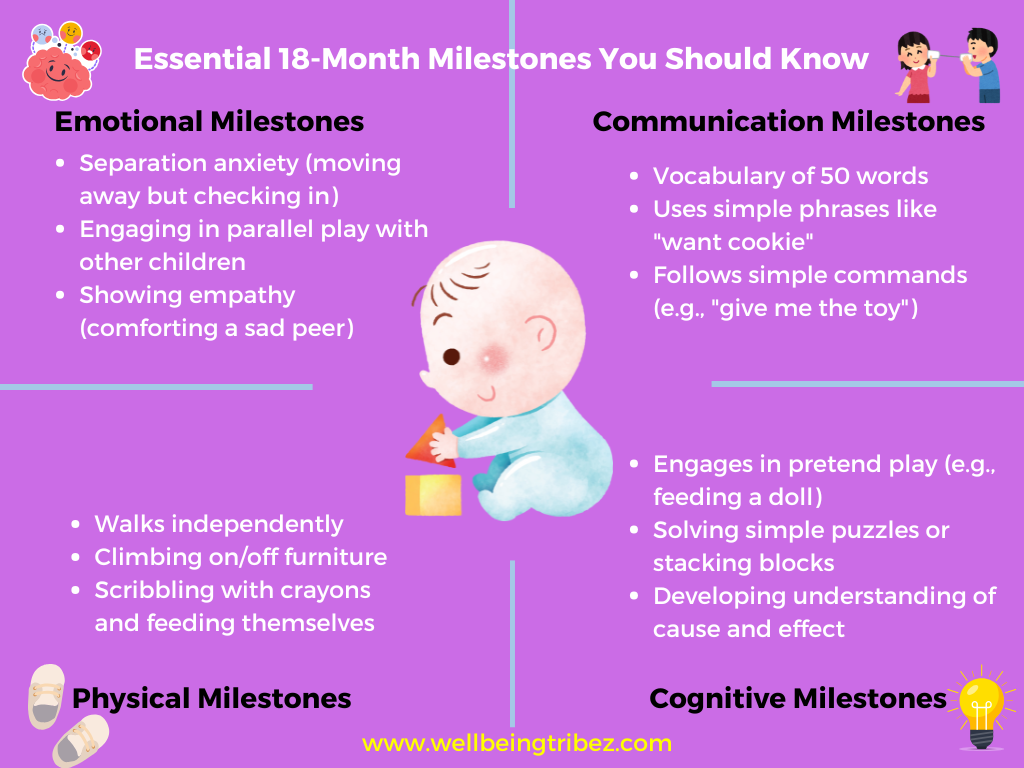Table of Contents
Did you know that toddlers aged 18 months to 24 months can learn 1 to 7 new words every week? This rapid development of spoken language is one milestone parents should look for as their child grows.
Monitoring the 18 Month Milestones is critical for determining whether your toddler is developing finely in terms of social, emotional, cognitive, and physical milestones.
Monitoring these critical milestones can allow you to help ensure that your child’s development is on track and can help you uncover any areas where extra help is needed.
Why Tracking 18 Month Milestones is Essential
At 18 months, the child has a significant developmental milestone. This is the stage where your baby starts the pavement of leaving babyhood behind and walking into toddlerhood, and it’s a time of significant growth in many areas.
At 18 months of age, toddlers develop not only motor skills but also quickly add more words to their vocabulary, interact socially, and explore the environment around them with new curiosity and independence.
Key 18 Month Milestones to Watch For
As your child approaches 18 months, they reach key developmental milestones in physical, language and emotional development. Tracking these key milestones promotes your child’s growth and lays the groundwork for future milestones.
Social and Emotional Milestones of 18 Month Olds
At 18 months, your toddler is more aware of their environment and social situations. This is the stage where they learn to assert their independence, usually in the form of saying “no” or not accepting help. These behaviours indicate early emotional development and a growing sense of freedom.
Key signs to look for include:
- Separation Anxiety: Toddlers at this age may wander away from their parents — but they’ll frequently look back to make sure they’re still close by.
- Social Engagement: Toddlers are beginning to engage in parallel play, which means they play next to other children but may not yet interact.
- Empathy and Emotional Recognition: Your toddler should start demonstrating empathy, such as comforting a sad peer, or recognising other emotions, such as happiness or anger.
Read more: A Hub for Babies and Toddlers: The Importance of and access to Early Childhood Services
Language and Communication Milestones
The 18-month mark is a key moment in language development. By this age, most toddlers have a vocabulary of about 50 words and are starting to combine them into simple sentences. They also understand more of what is being said to them and can follow simple one-step commands such as “Give me the toy” or “Come here.”
- Vocabulary Expansion: Toddlers begin to learn their environment quickly—1 to 7 words each week
- Gestural Communication: Toddlers still use gestures such as pointing or waving to communicate; this is a necessary element of the natural development of their social skills.
- Encouraging Language Development: Try to talk frequently to your toddler, use new words in daily activities, and read together often to enhance their vocabulary.
Physical Milestones at 18 Months
18-month-olds’ physical development is characterised by a greater need for mobility and increased fine motor skills. By this stage, most toddlers are walking on their own, and some will begin running short distances or climbing on furniture.
Key physical milestones to watch for:
- Walking and Running: The toddler must start walking confidently with no support, while some might be running or trying to climb stairs with help.
- Fine Motor Skills: Toddlers often start refining their fine motor skills at this age, meaning they can hold a crayon and start scribbling stack blocks or feed themselves with their fingers or a spoon.
- Independence in Physical Tasks: Most 18-month-olds are becoming quite capable of doing some tasks independently, like drinking from a cup without a lid and trying to feed themselves with utensils.
Read more: Essential Baby Photo Album Tips for Lasting Memories
Cognitive Milestones and Problem-Solving
At 18 months, cognitive development is characterised by problem-solving skills and more complex imaginative play. Toddlers this age can grasp cause and effect, such as pressing a button to turn on or light up a toy.
Key cognitive milestones:
- Imaginative Play: Pretend play is common at 18 months. Toddlers might pretend to feed a doll or mimic the actions of an adult when “cooking” in a toy kitchen.
- Problem-Solving: At this age, toddlers will play with toys that require them to solve simple problems – like getting shapes to fit into corresponding holes or building simple towers with blocks
- Focus and Attention: Toddlers are beginning to gain improved focus. They may spend more extended periods playing with toys and doing things like stack blocks or sort objects.

Toddlering and Growth Beyond 18 Months
As toddlers progress into this stage they start to separate themself more from their caregivers, which can cause more of those behaviors we would call toddler behaviours, defiance, getting a little more angry or trying to assert control. This is the start of their journey to become more self-sufficient. It’s crucial to recognise that these are normal, and establishing boundaries will allow your child to move through this phase successfully.
What You Can Do to Support Your Child’s Growth
Here are some hands-on ways you can encourage your child’s development as a parent and make sure they’re meeting key 18 month old milestones:
- Encourage Physical Play: Allow for plenty of time for your toddler to run and explore. Physical activities such as playing outdoors, running and climbing, as well as games that focus on jumping or balancing will help in enhancing motor skills.
- Support Language Development: Talk to your child throughout the day, share new words, read books together and sing songs to help increase their vocabulary.
- Foster Social Interaction: Encourage your child to engage with other children, whether in playdates or group activities. Such interactions are vital for fostering social skills and emotional awareness.
- Encourage Independent Play: Let your toddler play independently with toys and activities. Allowing them the space to sort things out themselves builds problem-solving skills.
Here are some key milestones of 18 month old toddlers to consider:
| Milestone Category | Fact | Source |
| Physical Growth at 18 Months | Girls: Average weight: 23.4 pounds (10.6 kg), Height: 31.8 inches (80.8 cm) Boys: Average weight: 24.1 pounds (10.9 kg), Height: 32.4 inches (82.3 cm) | Mama Project |
| Language Development and Vocabulary | By 18 months, toddlers typically know around 20-50 words and begin combining two or more words into simple phrases like “want cookie” or “big dog.” | American Speech-Language-Hearing Association (ASHA) |
| Cognitive Milestones | At 18 months, toddlers engage in imitative play, mimicking everyday actions such as pretending to cook, clean, or talk on the phone. | Centers for Disease Control and Prevention (CDC) |
| Motor Skills and Physical Activity | Most toddlers begin walking independently by 18 months, some may run short distances and climb furniture like couches or chairs. | American Academy of Pediatrics (AAP) |
| Learning New Words Each Week | Toddlers between 18 to 24 months can learn between 1 to 7 new words each week. | Pregnancy, Birth, and Baby (Australia) |
| Physical Activity Recommendations | CDC recommends toddlers get at least 30 minutes of structured physical activity and 1-2 hours of unstructured physical activity every day. | Centers for Disease Control and Prevention (CDC) |
| Importance of Early Developmental Screening | Only 1 in 3 children in the U.S. receive timely developmental screening, which is essential for detecting delays. | (NLM) |
When to Be Concerned and Seek Professional Help
While 18 months is an exciting time, there are inevitable developmental delays that could raise concerns. If your child is not walking independently, speaking at least a few words, or showing interest in social play, it may be time to seek professional help.
Signs that indicate a need for intervention:
- Lack of Walking or Crawling: If your child has not yet started walking or is unable to pull themselves up to stand, it could indicate a motor delay.
- Speech Delays: If your toddler is not saying any words by 18 months, or if their speech seems significantly behind peers, consult with a paediatrician or speech therapist.
- Limited Social Interaction: If your toddler avoids eye contact, shows little interest in playing with others, or does not react to emotional cues, it may be worth seeking professional advice.
If you notice these signs or have any concerns, talk to your child’s doctor. In some cases, early intervention programs or therapy can provide essential support to help your child meet their developmental milestones.
Conclusion
The 18 Month Milestones are crucial for tracking your toddler’s development. From language and social skills to physical coordination and cognitive growth, these milestones provide essential insights into your child’s well-being. As a parent, tracking these milestones helps you ensure your child is on the right developmental path and gives you the tools to support their growth.
At Wellbeing Tribez, we provide a platform designed to support parents with valuable resources and expert advice on child development.
Whether you’re looking for guidance on raising a thriving toddler or need access to specialised services, our community is here to help you navigate every stage of your child’s journey. Join us today to connect with professionals and resources that understand your family’s unique needs.
GET IN TOUCH
Schedule a Visit
FAQs
- La mejor diversión digital la encuentras en Cocoa Casino
- Erleben Sie die besten Spielautomaten bei Stargames
- Cómo el entretenimiento digital se convierte en un hábito diario
- Crashing Fatigue Symptoms: A Deep Dive Into Recognizing and Managing Extreme Exhaustion
- Raising Awareness: A Walk & Talk Event for Black Men’s Health in London

